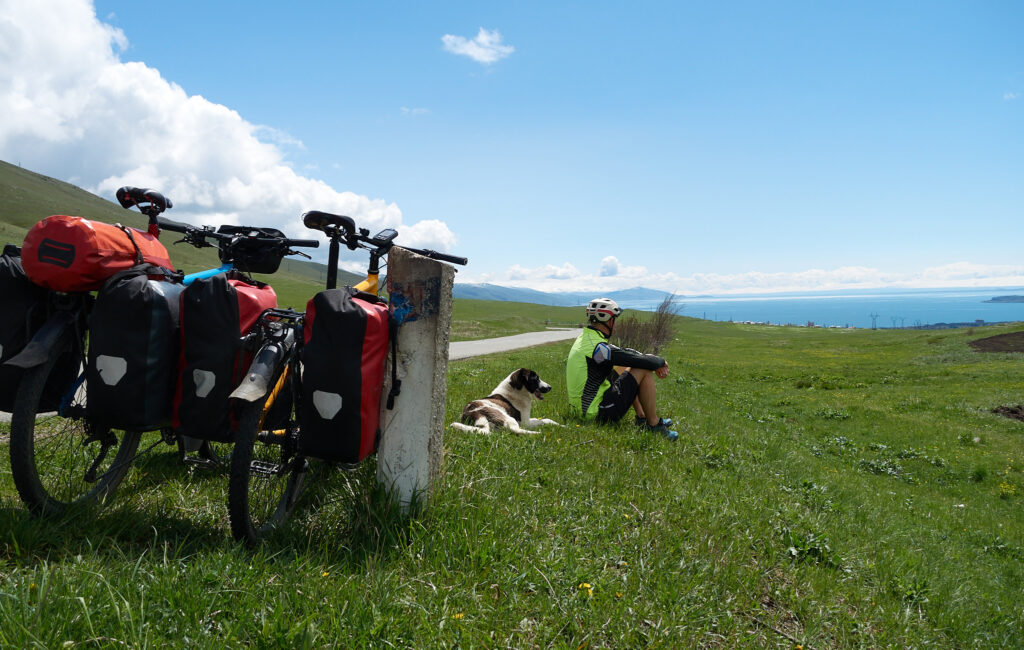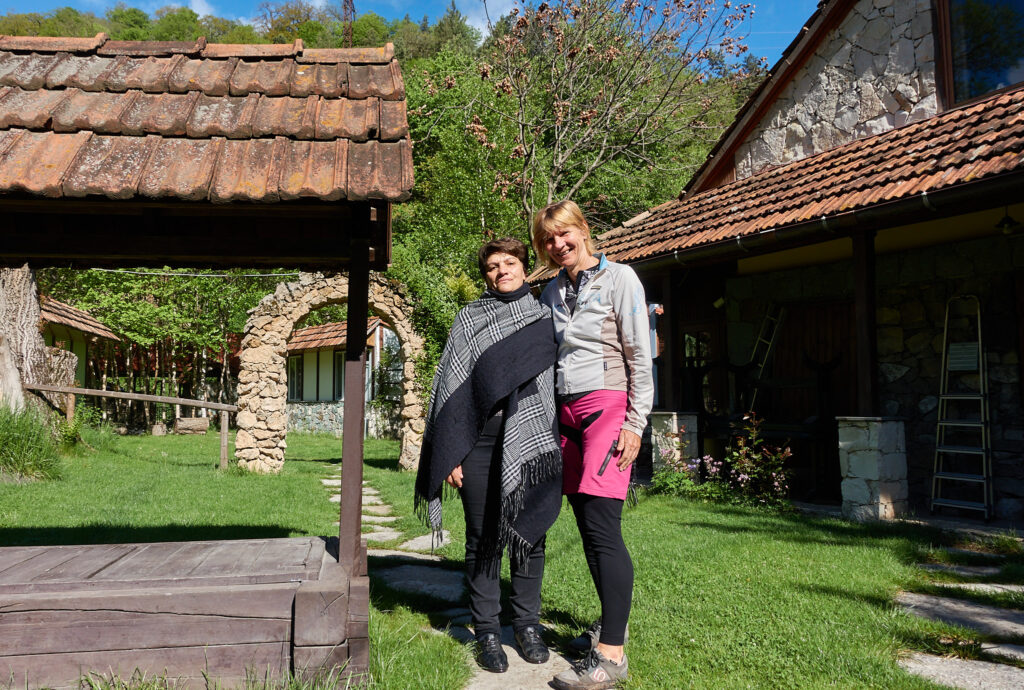So many kilometers and so much time we have never spent with our touring bikes in any mountain area in Europe . This adventure is coming to an end. We have enjoyed it to the fullest and experienced so much.
The diversity here between Europe and Asia, rugged mountains, green gorges, wine regions, subtropics on such a small area are overwhelming. The snow-covered mountains have accompanied us except for two days. We rode three days in a row only through great gorges.
You can find our current route here: https://rapl-kiste.de/wp/maps/ . With one click you can zoom in on all the details.
If you are not afraid of the climbs and descents, you can explore the Caucasus by bike very well. Our robust touring bikes with MTB frames and gear ratios are ideal for this, however on previous trips we sometimes thought a randonneur would be great too. The better the road, the faster the cars. You have to get used to the driving culture a bit. Then it is not more dangerous than here. If the road is smaller, there is less traffic. If it is not paved, it is usually one pothole after another. Thus we contradict the two travel guides Loose and DuMont that Georgia and Armenia are not suitable or even dangerous for cyclists.
Nevertheless, after four weeks, 1800 kilometers and 18400 meters of altitude, we have an average speed of a good 17km / h. Downhill it goes already times fast over 60 km/h, top 69.3 km/h. Especially because of the front wheel luggage the bikes have a very good road holding. We have no flat tire yet.
There are no cyclists in the Caucasus. Only on the transit route Armenia-Georgia we counted six travel cyclists. (We do not count Batumi as part of the Caucasus: here, like in every large seaside resort, people cycle and sport on the beach promenade).
In the four weeks we have eight nights in our tent which is more than expected. When we started we were afraid that we cannot use tent and accessories at all, because there are more or less no campsites here.
There are free-roaming dogs, herding dogs, guard dogs, stray dogs, leashed dogs, barking dogs, yapping dogs, friendly dogs, aggressive dogs. The panic attacks when dogs chase us aggressively have diminished over time and we have become more relaxed. A single dog has bitten into the rear fender and brought the bike to a halt along with the rider. Maybe he polished his muzzle in the wheel, but somehow he then let off.

We still have not seen bears. But the bird lover gets his money’s worth. Orioles, bee-eaters and lots of hoopoes accompany our rice. How often have we dreamed of seeing these birds while playing the strategic family game ‘Wingspan’.
Our Caucasian hosts welcome us with open hearts, so happy, so warm, that sometimes we are not able to deal with it. ‘You come from Germany? By bicycle? What do you think of Georgia? I’m glad you like Armenia. The water for the shower is already hot. Do you want another coffee? Do you like the room? I’ll show you the whole house. It is a tradition that we have shashlik on Friday. Here you are! You are dear guests, our friends, my sister.’ If common language skills allow, you also learn all about the hosts, the family, the country and the culture. Cheers to the Mayas in Sighnagi, in Atskuri and in Batumi, Susann, Marita, Anna, Varujhen, Boris, Manana and Georgi, Lascha …

Caucasians are the most honest and trusting people. They do not lock the house. We do not need to lock our bikes either. Georgia and Armenia are safe countries to travel. The most danger are storms, especially when camping. The second most danger are earthquakes. But nobody needs or wants your belongings. They tell you the password of their credit card in the hope that you help them at the ATM, even though you do not know their language. The police or military has been friendly to us at all times. In Yerevan, Rolf was asked to take a picture of five on the park bench.
Besides the locals, we also met many travelers with whom we had nice conversations and good exchanges. Many came from Moscow or Saint Petersburg, Mario from Leipzig, Ilias from Algeria and a wanderer couple from Italy, the nice man who went to Georgia after 18 years of live in Paris and renovates his father’s house, travelers from Japan and Korea. All very casual.
Ready-made meals belong to the First World. Here we are in the (formerly) Second World. The basic foodstuffs are still processed. Flour is made into bread or Khinkali (noodles, pasta), fruits and vegetables are not bought in the store, you have it yourself, buy it on the street or at the market. Plucked chicken are already the ready-made meal. Often enough there is the chicken also individually, unplucked or even alive.
By the way, ice cream is also one of the staple foods that you can afford every day.
If you stay at an inn, they often cook on very short notice. We were usually surprised and it was always delicious. But beware. If you do not like coriander, you are in the wrong place. They must have huge coriander plantations here. Anyway, there is to almost all dishes coriander full.
Getting sick is not a good idea in this countries. It gives the impression that the foreign health insurance we have taken out is mainly there to fly us home when we need medical help. Fortunately, we are as fit as sneakers and have not yet needed a pain killer out of our travel pharmacy.
A trip through the Caucasus makes us reflect. Not everything was better in the past, but some things were, and some things may come back.
